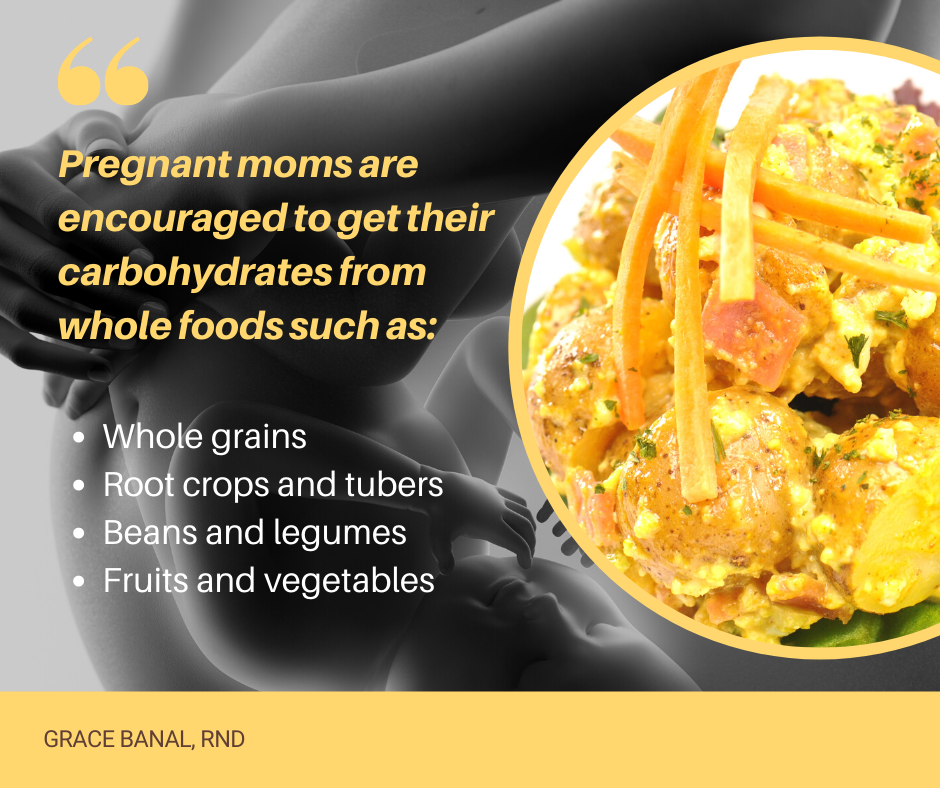Most of us are aware that pregnant moms need more energy (calories) and protein, especially during the 2nd and 3rd trimesters and most especially if the mom is underweight prior to getting pregnant. This is because pregnant moms have higher basal metabolic rate and therefore need extra calories from their diet. Protein is also needed …

Most of us are aware that pregnant moms need more energy (calories) and protein, especially during the 2nd and 3rd trimesters and most especially if the mom is underweight prior to getting pregnant.
This is because pregnant moms have higher basal metabolic rate and therefore need extra calories from their diet. Protein is also needed for the development of the baby, mom’s uterus and other mammary tissues.
On the other hand, carbohydrates are just as important during pregnancy because:
- Carbohydrates provide energy that help pregnant moms gain appropriate weight during pregnancy. In general, moms within normal weight prior to getting pregnant should gain about 11 – 16 kg during the entire pregnancy. When a pregnant mom’s weight gain is on track, the baby is most probably growing well, too.
- Aside from providing energy for the growing baby, carbohydrates also provide energy for moms who are physically active. I was still working (as a nutritionist and personal trainer at that) during my first and 2nd trimesters of pregnancy and the extra energy from carbohydrates helped me keep going. Please consult your OB-GYN for specific advice about physical activity during pregnancy.
- Carbohydrate-rich foods contain fiber which help prevent hemorrhoids common among pregnant women. I personally experienced this soon before I gave birth and oh boy was it painful! After ko manganak mas ramdam ko yung sakit ng hemorrhoids kaysa sa sakit ng tahi ko 😀
- Aside from fiber, foods that contain carbohydrates (fruits, vegetables, grains, tubers and root crops) also provide micronutrients such as B-vitamins especially folate, vitamin A and vitamin C which are necessary to keep both mom and baby healthy.
For these reasons, pregnant moms are encouraged to eat about 175 grams of carbohydrates per day (ASPEN 2007). Pregnant moms are encouraged to get their carbohydrates from eating whole foods such as whole grains (brown rice, corn), root crops and tubers (potatoes, sweet potatoes), beans and legumes, fruits and vegetables. This is to make sure that they also get important nutrients other than carbohydrates.
For more information about whole foods, please click this link:
https://www.facebook.com/gracebanaldietitian/posts/3680627631948878
Just like most moms, I, too, had unusual food preferences then. I craved for fresh and plant-based foods most of the time and I didn’t want to eat meat! ?
Which is why for today I will be sharing with you one of my favorite foods when I was pregnant – Curry Potato Salad!
Potatoes provide pregnant moms with energy, complex high-fiber carbohydrates and protein. Potatoes also contain potassium, iron, vitamin C and vitamin B6 which help moms stay healthy during pregnancy. So, here it is:
Curry Potato Salad
No of servings: 5
Ingredients:
600 grams Potatoes
1 tsp Olive oil
65 grams Sliced ham
1 pc Hard-boiled egg white
2 1/2 tbsp Low fat cooking cream
1 tbsp Mayonnaise
1/3 cup Chopped onion
1 1/2 tbsp Curry powder
Salt and pepper to taste
1 tbsp Sugar, white
1. Wash and boil potatoes until tender.
2. Toast ham in non-stick pan until cooked.
3. Boil the eggs and discard the egg yolks. Mash the egg whites and set aside.
4. In a bowl, combine potatoes, sweet ham, mashed egg whites, low fat cream, mayonnaise
and curry powder. Mix ingredients thoroughly.
5. Season with salt, pepper and sugar.

Word of caution, though.
Pregnant women also need to control their carbohydrate intake because too much carbohydrates in the diet may cause excessive weight gain. This, along with other risk factors, can result to Gestational Diabetes (GDM) which is detrimental to both mom and the baby.
Next time, we will discuss more about GDM and low carbohydrate diets for pregnant moms so stay tuned.
Kain po mommies! ?
Disclaimer:
This post is for general information purposes only. Please consult your doctor for specific medical advice. Specific nutrition recommendations may vary with each individual so please consult a licensed dietitian for a personalized dietary advice.
This post is sponsored by Potatoes USA – Philippines. All opinions stated above are my own and references are indicated below.
Reference:
Gotsclich, M. M. (2007). The ASPEN Nutrition Core Curriculum: A Case-Based Approach – The Adult Patient









